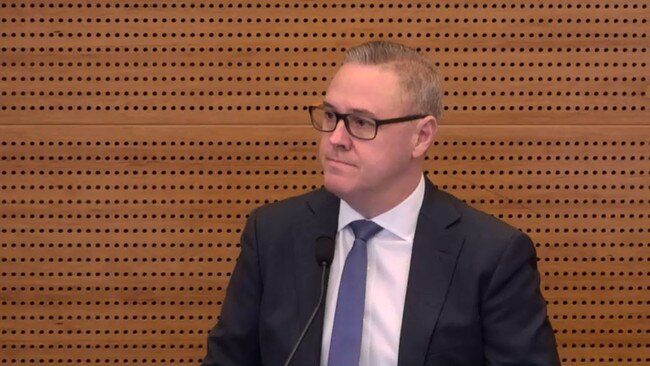Banking royal commission: AMP admits to charging dead customers with life insurance fees
AMP continues to charge dead people for life insurance even after it has been notified of a customer’s death.

Scandal-ridden wealth giant AMP is continuing to charge dead people for life insurance, even after it has been notified of a superannuation customer’s death.
AMP, which has once again been forced to front up at the financial services royal commission, ignored concerns from its own staff members about the practice, which it disregarded in favour of aiming to refund life insurance premiums instead of stopping the charging of fees upon notice of death.
The royal commission also heard on Monday how AMP shunted non-smoking superannuation members into a default life insurance product that charged a higher rate — of about $400 a month in the case of one customer — that they could opt out if they notified AMP they were a non-smoker.
It did this, despite having a separate third rate for smokers, although there was little apparent difference between the default “de-linked” smoking rate and the “smoking” rate.
Under questioning from counsel assisting the commission, Mark Costello, AMP’s head of wealth management Paul Sainsbury admitted the company knew it had been charging life insurance fees to dead customers since 2016.
After Kenneth Hayne’s royal commission revealed Commonwealth Bank was stinging dead customers with fees, AMP launched its own review to find out if it had slugged the dead with charges it was not entitled to make.
AMP eventually discovered it must now refund more than $1.3 million in wrongly-charged life insurance premiums to more than 4600 customers who had died.
While it has reported part of the problem to the Australian Prudential Regulation Authority and ASIC in June, it has yet to formally notify the regulators of the full extent of the fees charged to the dead.
Keep up with royal commission developments via our live blog
This morning Mr Hayne asked Mr Sainsbury: “Charging premiums to life insurance to someone who’s dead, that’s the position isn’t it?”
“Yes, that’s the way the system is treating it today for a portion of our business,” Mr Sainsbury admitted.
An email from AMP head of claims Natalie Tumeth shown to the commission revealed staff had raised the issue with AMP’s corporate superannuation business “in the past”.
Mr Sainsbury said the company had considered stopping life insurance premiums when it was notified someone had died.
But in an internal AMP email sent in April this year, an AMP executive told Ms Tumeth: “I believe we were of the understanding that the premiums are refunded when the policy is paid which is incorrect.”
“Stopping the premiums upon notification of death, seems a rather obvious step, but it wasn’t taken in 2016,” Mr Costello said.
“What does it say about AMP’s systems that in issue was identified in 2016 but an investigation was only launched in 2018?” he said.
Mr Sainsbury conceded that the conduct fell below community standards and expectations, but did not agree that AMP had failed comply with laws requiring it to act efficiently, honestly, and fairly.
This prompted Mr Hayne to interject: “Has it charged for something its not entitled to charge?” to which Mr Sainsbury agreed.
It was also revealed that AMP’s superannuation business — which uses AMP’s life insurance arm as its only insurance providers — charged customers a higher life insurance rate than the “non-smoking” rate when they were “de-linked” from their financial adviser.
However, after an initial 2005 letter explaining which insurance cover they were provided with, AMP, until 2013, failed to disclose to its members what rate of insurance they were paying.
Mr Sainsbury said AMP last reviewed the appropriateness of using its own life insurer for its superannuation members in 1995.
One customer complained to AMP when they found out they had been charged $72,000 in extra premiums when they were not a smoker. The royal commission heard the man last tried a cigarette when he was a 13 year old boy scout.
Although AMP had three different life insurance rates — Non-smoker, a de-link category, and a smoker category — the only difference to get out of paying the higher-rate de-link premiums and be charged the cheaper non-smoker rate was to fill out a non-smoking declaration.
Mr Costello asked whether this made the “smoking” rate or the “de-link” rate redundant.
“So nothing else matters?” Mr Costello asked, to which Mr Sainsbury agreed.
Last week, the corporate regulator said the wealth management industry has been “unfairly eroding” the superannuation savings of members by defaulting them into high-premium life insurance policies designed to cover smokers.
According to the Australian Securities & Investments Commission on Friday, the super sector and the life insurance industry have now stop defaulting members as smokers when there was an absence of information about whether they smoked or not. Smokers were charged significantly higher premiums than non-smokers, and ASIC said the rip-off “unfairly eroded” member retirement savings. According to sources in the industry fund sector, this practice was only occurring in for-profit retail funds.






To join the conversation, please log in. Don't have an account? Register
Join the conversation, you are commenting as Logout